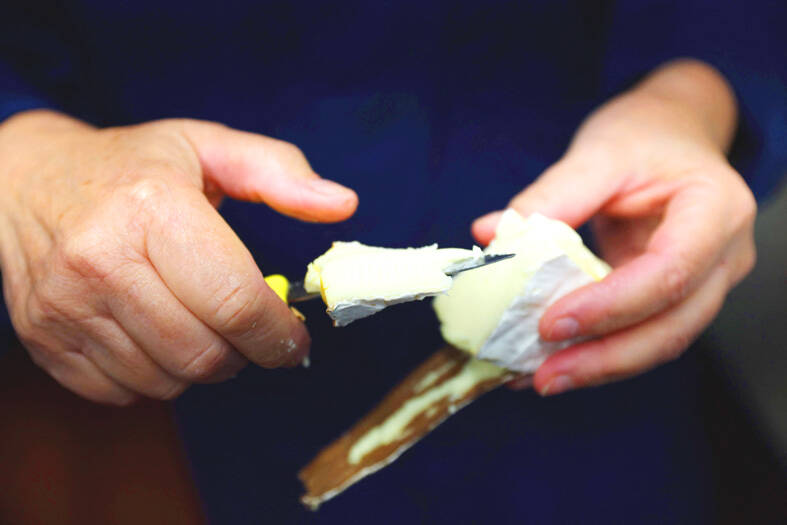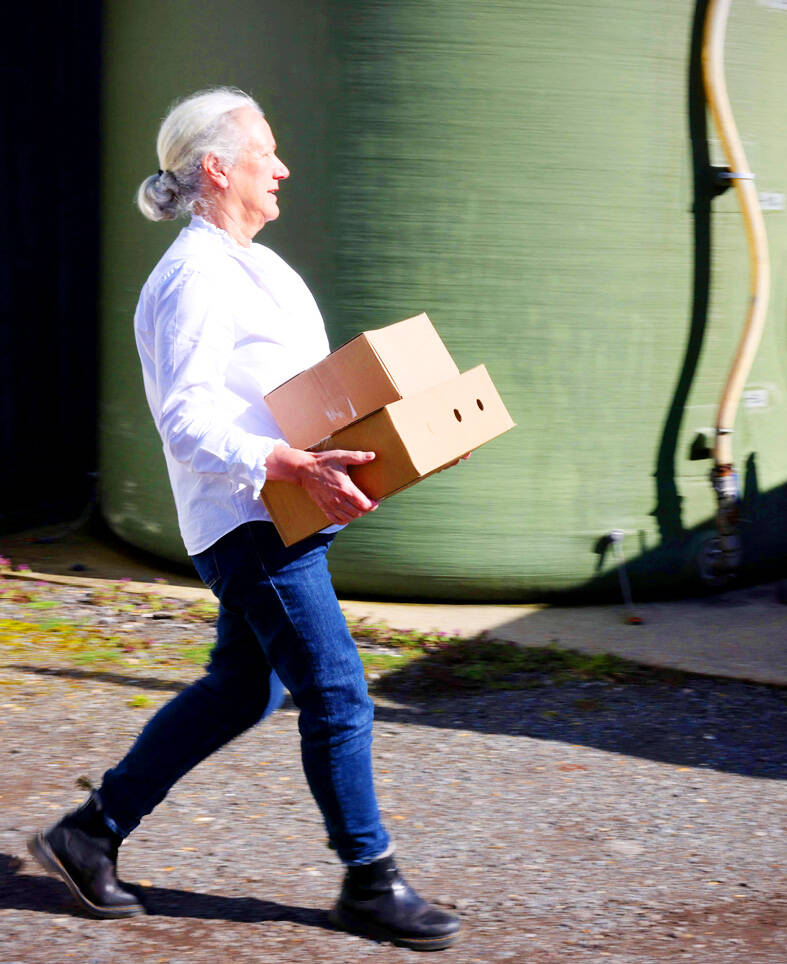“I never thought it would be as big as this,” said Stacey Hedges of her booming French-style cheese business, as another truck-load left the green Hampshire countryside for some of Britain’s finest restaurants.
Former chef Hedges founded the Hampshire Cheese Co in 2005 and started producing Tunworth, a handmade Camembert-style cheese.
She is one of dozens of entrepreneurs who have gone into cheese-making across England, Scotland and Wales. As a result, the country now produces a wider variety of soft cheeses alongside traditional British hard cheeses such Cheddar.

Photo: AFP
France, the “country of a thousand cheeses,” is often a source of inspiration.
Nine employees work in Hedges’ creamery near Basingstoke in England’s southern Hampshire region, making about 7,000 cheeses a week, and up to 12,000 during the Christmas season.
Her Web site even carries a quote from French chef Raymond Blanc, who describes Tunworth as “the best Camembert in the world.”

Photo: AFP
While a provocative remark for Blanc’s countrymen, it is undeniable that the cheese has made its mark on menus and shelves across the UK.
In the Basingstoke factory, there is not a machine in sight. Everything is done by hand, from the handling of the milk — delivered by a neighboring farm — to the packaging in a round wooden box imported from France.
As well as Tunworth, the Hampshire Cheese Co also makes the softer Winslade, which Hedges likens to Vacherin.
The 61-year-old received help from French experts, who advised her on the manufacturing process.
“In this country we have Stilton and Cheddar, but we don’t have the knowledge for soft cheese,” Hedges said.
Her success has inspired other Britons.
“It’s a very exciting time to be in the industry,” said Bronwen Percival, technical manager at Neal’s Yard Dairy, which has four shops in London selling almost exclusively British cheese.
“There are new people coming out all the time with a real entrepreneurial spirit,” she said. “We sell mozzarella from Italy, but if somebody [British] arrives on the scene making a beautiful mozzarella, as good as the one we currently sell, we might decide to switch.”
This has already happened with homegrown varieties of Brie and Camembert, as the UK dairy industry continues to adapt from the shock of deregulation in the 1990s.
Prior to then, a state marketing board regulated the production and distribution of milk, setting a floor under prices for other diary products.
After the board was abolished and the price of milk plummeted, diary producers were under pressure to add value through other products.
They responded with soft cheeses, which proved a hit with consumers.
“The key thing is people want to know where the food they eat is from and support local producers,” said Tracey Colley from the Academy of Cheese, which runs tasting courses and events such as the British Cheese Weekend.
The COVID-19 pandemic has also helped.
“When people stayed at home, cheese became a treat for some,” she said.
Yet it is still a long way from mass consumption.
“Everyone has Cheddar in their fridge,” but other cheeses remain fairly niche, Colley said. “What we’re trying to change with the academy is to get people in the same mindset as in France: Eat cheese every day.”
Ironically, France is one of Neal’s Yard Dairy’s top foreign markets.
Hedges sells her Tunworth in Hong Kong, the US, Belgium, the Netherlands and elsewhere, but she draws the line at trying to break into the home of Camembert.
“Do you think the French would buy British Camembert?” she asked, jokingly.

With an approval rating of just two percent, Peruvian President Dina Boluarte might be the world’s most unpopular leader, according to pollsters. Protests greeted her rise to power 29 months ago, and have marked her entire term — joined by assorted scandals, investigations, controversies and a surge in gang violence. The 63-year-old is the target of a dozen probes, including for her alleged failure to declare gifts of luxury jewels and watches, a scandal inevitably dubbed “Rolexgate.” She is also under the microscope for a two-week undeclared absence for nose surgery — which she insists was medical, not cosmetic — and is

CAUTIOUS RECOVERY: While the manufacturing sector returned to growth amid the US-China trade truce, firms remain wary as uncertainty clouds the outlook, the CIER said The local manufacturing sector returned to expansion last month, as the official purchasing managers’ index (PMI) rose 2.1 points to 51.0, driven by a temporary easing in US-China trade tensions, the Chung-Hua Institution for Economic Research (CIER, 中華經濟研究院) said yesterday. The PMI gauges the health of the manufacturing industry, with readings above 50 indicating expansion and those below 50 signaling contraction. “Firms are not as pessimistic as they were in April, but they remain far from optimistic,” CIER president Lien Hsien-ming (連賢明) said at a news conference. The full impact of US tariff decisions is unlikely to become clear until later this month

GROWING CONCERN: Some senior Trump administration officials opposed the UAE expansion over fears that another TSMC project could jeopardize its US investment Taiwan Semiconductor Manufacturing Co (TSMC, 台積電) is evaluating building an advanced production facility in the United Arab Emirates (UAE) and has discussed the possibility with officials in US President Donald Trump’s administration, people familiar with the matter said, in a potentially major bet on the Middle East that would only come to fruition with Washington’s approval. The company has had multiple meetings in the past few months with US Special Envoy to the Middle East Steve Witkoff and officials from MGX, an influential investment vehicle overseen by the UAE president’s brother, the people said. The conversations are a continuation of talks that

CHIP DUTIES: TSMC said it voiced its concerns to Washington about tariffs, telling the US commerce department that it wants ‘fair treatment’ to protect its competitiveness Taiwan Semiconductor Manufacturing Co (TSMC, 台積電) yesterday reiterated robust business prospects for this year as strong artificial intelligence (AI) chip demand from Nvidia Corp and other customers would absorb the impacts of US tariffs. “The impact of tariffs would be indirect, as the custom tax is the importers’ responsibility, not the exporters,” TSMC chairman and chief executive officer C.C. Wei (魏哲家) said at the chipmaker’s annual shareholders’ meeting in Hsinchu City. TSMC’s business could be affected if people become reluctant to buy electronics due to inflated prices, Wei said. In addition, the chipmaker has voiced its concern to the US Department of Commerce